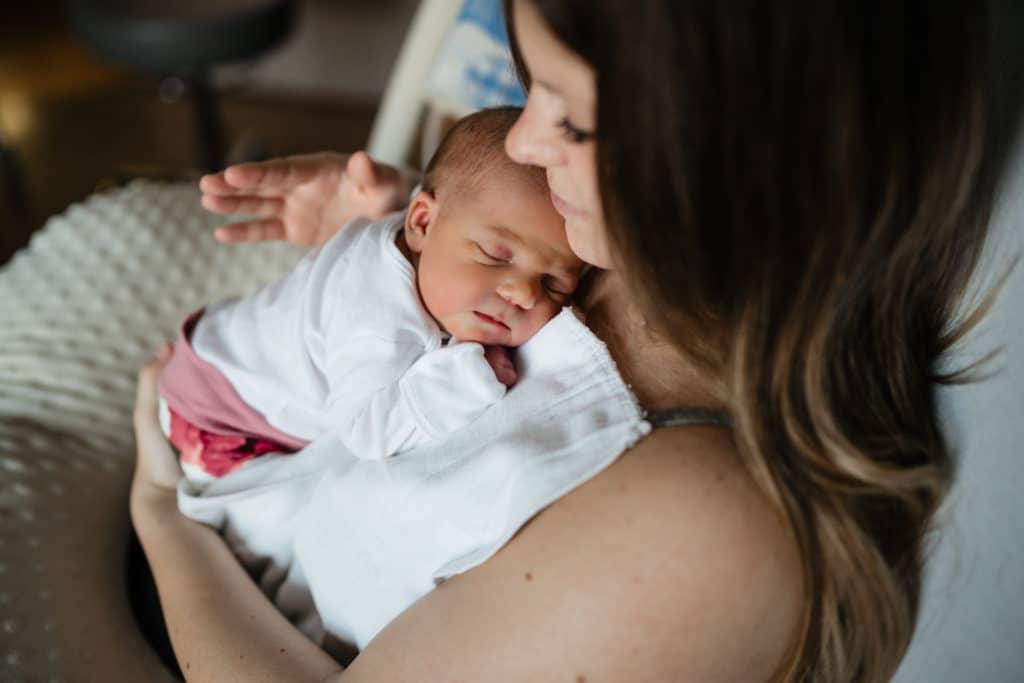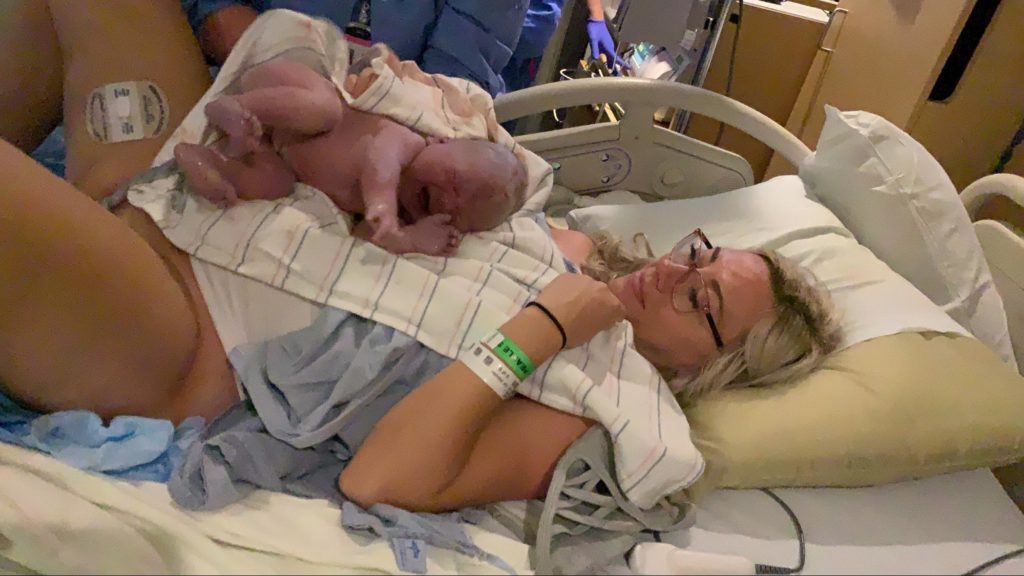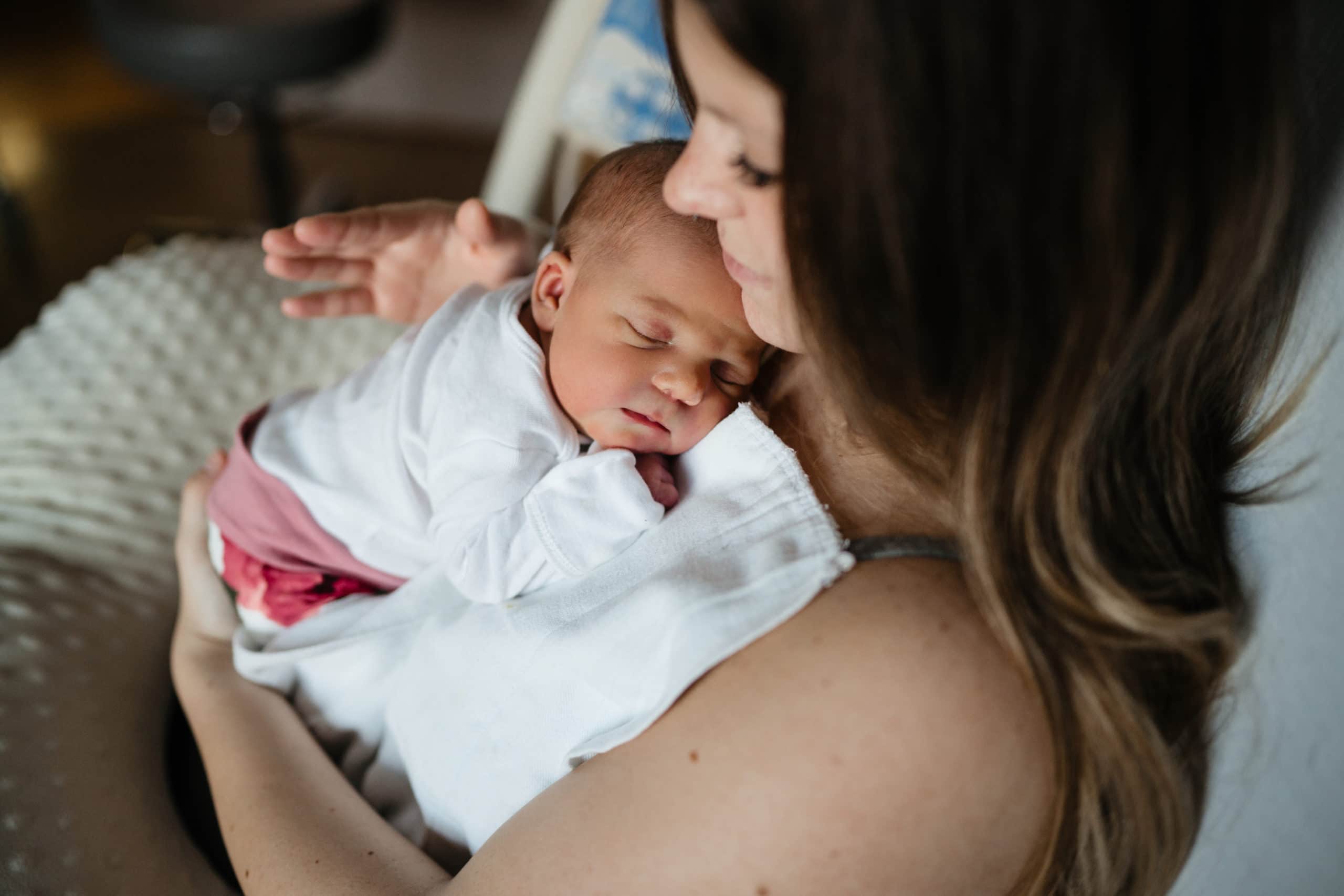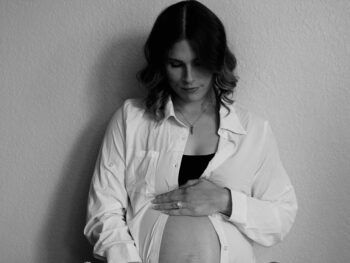We want to talk about something that may be a little sensitive for some. Here it goes: just because you have a VBAC doesn’t mean it will be perfect — you can still experience lasting effects of birth trauma. And if you have a repeat Cesarean, it might just well be the most empowering experience you will have.
As a doula and educator who advocates against unnecessary C-sections, you’d think that contradicts everything I stand for. Let me explain.
It is common for parents to underestimate birth-related trauma because they are in the postpartum period. It is easy to shrug things off and excuse them as hormones, baby-blues, or any number of reasons.
There are many births, both vaginal and Cesarean, that leave parents struggling with trauma or PTSD. This article talks about how to identify, heal, and cope with birth trauma.
If you feel that you are struggling with trauma right now, please reach out to someone you can trust or jump ahead to the resources listed below.
Originally published October 3, 2018, this article was updated and republished on April 27, 2020.
What is birth trauma?

Birth is unpredictable. It is unknown and unexpected. It is perfectly beautiful and incredibly messy. It can be traumatic and healing and full of all sorts of emotions, both positive and negative, that can exist in the same space at the same time.
Vaginal birth isn’t always perfect and beautiful, and Cesareans aren’t always traumatic and heartbreaking.
But what does birth trauma ACTUALLY mean? How do you know if you have trauma, PTSD, depression, anxiety, or just the plain old baby blues?
Birth trauma and postpartum depression share some of the same symptoms but, because they are completely different from each other, they need to be treated differently as well. It is also common to have birth trauma AND postpartum depression, so treating both, with medical support, might be part of the healing process.
Birth trauma is a simple way to say PTSD (post-traumatic stress disorder) after birth. It may also apply to parents who have some, but not all, of the symptoms required to diagnose PTSD.
It is common for people to confuse the term PTSD as something only military service members can get from war-related experiences, because the identification of the disorder first appeared in soldiers after the Vietnam War. However, PTSD can happen to anyone after any traumatic event.
It is important to note that trauma lies with the person who experienced it or witnessed it, and it is not necessary for anyone else to perceive the event as traumatic at all.
Primary symptoms of birth trauma (PTSD)
PTSD has four main symptoms as explained by the American Psychiatric Association:
- Intrusive thoughts, including reliving the birth event through nightmares, involuntary memories, or flashbacks, causing you to feel panicked, stressed, or anxious.
- Arousing and reactive symptoms, such as being constantly on guard, prepared for anything bad to happen that makes you irritable, jumpy, and highly alert. Not being able to sleep well and having problems concentrating also fall under this primary symptom.
- Negative thoughts and feelings, like feeling down and depressed, generally. Maybe even blaming yourself or feeling guilty about the things that happened to you. There might even be parts of the experience you simply cannot remember.
- Being hypervigilant about avoiding reminders of the trauma. This can include things like altering your route to avoid driving past the location of your birth, avoiding certain smells, or removing yourself from a room when someone is telling their own birth story.
PTSD related to a birth event is an involuntary response from the brain. The biggest indicators of birth trauma are the level of obstetric interventions and the perception of care. How a parent PERCEIVED themselves being treated, or how their partner was treated makes more of an impact on whether a parent will suffer from postpartum PTSD than any other thing.
It is an involuntary brain response that cannot be cured by someone telling you to “pull yourself together” or “focus on the good things, like your baby.”
According to Bessel van der Kolk, MD, one of the leading researchers in Post-Traumatic Stress Disorder, “Trauma is not the story of something that happened back then,” he adds. “It’s the current imprint of that pain, horror, and fear living inside people.” This can be translated to trauma living inside our bodies and experiencing it as if it is happening right now.
Psychology Today
Let us not forget the birth partners or other support people who are in the room during a traumatic event. They too can be affected by PTSD and need to be acknowledged as we so often focus primarily on the person who gave birth.
What causes birth trauma?

According to researchers studying postpartum PTSD, a traumatic experience during birth creates a hyper-aroused, fight-or-flight state in the brain:
The brain’s amygdala, which normally helps store memories, becomes hyper-responsive, leading to an exaggerated sense of fear. Parts of the brain that normally inhibit the amygdala stop working. When something reminds a sufferer of her traumatic experience, her unusually terrifying memories feel like more than memories; they feel like they’re still happening.”
There is a complexity to birth trauma and PTSD that is still being studied, reviewed, and understood. However, there are many things that can contribute to a parent’s likelihood of developing postpartum PTSD.
Perception of care
How a person perceives being cared for by medical practitioners impacts how they feel about their birth in general. If they feel unheard, misunderstood, or that their wishes aren’t respected, it can lead from negative feelings about their experience clear up to birth trauma. Feeling that you have a say in your birth, as it is happening, is a critical part of avoiding trauma.
Obstetric violence or abuse from providers
Unfortunately, obstetric violence isn’t that uncommon, and it’s often dismissed or accepted in a medicalized birth setting.
Reports of violence are frequent: denial of the presence of the companion of the women’s choice; lack of information about the different procedures performed during care; unnecessary cesarean sections; deprivation of the right to food and walking; routine and repetitive vaginal exams without justification; frequent use of oxytocin to accelerate labor; episiotomy without the consent of the women; and Kristeller’s maneuver. All these events can ultimately lead to permanent physical, mental and emotional damages.
NCBI: Obstetric violence in the daily routine of care and its characteristics
I once attended a birth where an OBGYN didn’t like that my client had decided to turn off the epidural so she could be more mobile to get in better positions to help her labor progress. As my client was struggling to endure intense contractions and change positions, this provider was in her face, yelling and wagging a finger at her. The provider then insisted on doing a vaginal exam THIS SECOND.
When my client asked if she could wait until the contraction is over the OB yelled “NO!” and proceeded to perform a vaginal check, without consent, while my client was wailing out in pain.
The OB continued to yell as she prepped my client for a Cesarean. My client was exhausted, in pain, and traumatized. She was begging for me to be allowed in the O.R. to support her and was quickly denied.
The intensity of that situation has never left my mind, even five years later. When she returned from the C-section, my client was bright-eyed and happy, praising her OBGYN and “so grateful” for the experience. Her brain had immediately built up the walls around the event to protect herself from the trauma she had experienced.
Sudden changes in plans or expectations
When things quickly take a turn towards something unplanned and not wanted, like a Cesarean, it can force a parent to react in a hyper-stimulated way. There may not be enough time to go over possibilities or discuss options when there is a true emergency and staff just needs to react swiftly to save a life.
Pain medication not working
We hear so many stories on The VBAC Link Podcast about parents whose epidural didn’t work all the way, or only on half of their body. They felt the whole Cesarean, or were dismissed in their distress and knocked out under general anesthesia. This is a prime scenario for birth trauma.
Interventions
Even when interventions are necessary, these unplanned and unprepared for scenarios can be difficult to process. Sometimes interventions to get the baby out can’t be avoided, like in the case of shoulder dystocia, a transverse baby, or other complications during the delivery.
Intervention doesn’t necessarily mean having a C-section. Operative vaginal delivery techniques, like forceps delivery and vacuum delivery, are also used to assist mothers through a difficult birth.
When a parent later learns that one or more of these things could have been avoided, it can be devastating.
The duration of labor
Long, tedious labors can take a huge emotional toll on a mother. Lack of sleep, nutrition, and mental clarity can have a big impact on how a parent reflects back on their birth.
Prolonged labors can cause fears and stresses to be amplified as time progresses. These fears and stresses include:
- The need for undesired interventions
- Being put on a “time clock” for labor to progress
- Feeling like you are a pot of water being watched and not “performing” as expected
- Failure to meet expectations of yourself or how your birth will go
- Feeling like an overall failure and not being able to “do it right”
All of these intrusive thoughts and feelings triggered by a longer than expected labor can leave lasting impressions on the mind and influence the likelihood of a parent having birth-related trauma.
Stillbirth
It goes without saying that a miscarriage or stillbirth causes a great amount of grief and pain for parents. It is normal and expected for parents suffering a loss to have trauma surrounding their birth.
Little or no communication between staff, birth parent, and partner
This is a big one that contributes to how parents perceive their care. Even a simple conversation including an explanation of recommendations and an opportunity for questions afterward can make a huge impact on whether parents feel heard and understood.
Fear
Fear is the enemy, it is an exaggeration of the unknown, and forces us to live through negative emotions before they have the possibility of happening. We highly encourage you to work through fears prior to labor starting so you can enter your birth space prepared and confident.
We have a digital download of a fear release activity at the end of the blog.
How a traumatic birth affects new parents

Birth trauma causes a range of negative effects for new parents, some of them long lasting. It’s important to seek treatment to help mitigate these effects begin to heal.
These are just some of the difficulties parents experience after birth trauma:
- Loneliness: Birth trauma PTSD often leaves parents struggling to find help and support. It can be a very lonely place without anyone who understands the impact of a traumatic birth.
- Guilt: No one talks about their traumatic birth stories and even between parents who share similar birth-related trauma, each person handles it differently. It can be even more depressing if they feel guilty or responsible, somehow. That is a terrible burden to bear and something that even health care professionals don’t address.
- Avoiding future pregnancy: Many parents may feel conflicted between wanting additional kids, and their traumatic response to stay away from another pregnancy.
- Strained relationships: The absence of help can negatively affect the associations with loved ones that parents rely on for support. They may likewise lose enthusiasm for intimacy which can put an incredible strain on their physical and emotional relationships.
- Avoidance of triggers: Some parents may avoid situations where they will be reminded of their traumatic experience. This can even include avoiding necessary medical procedures and exams to avoid flashbacks.
- Difficulty bonding with the new baby: For some parents, their biggest concern is the everyday challenges they experience trying to bond with their new baby who they see as a consistent reminder of their traumatic experience.
Healing from a traumatic birth experience
If you or a loved one are experiencing any or all of these symptoms, we encourage you to reach out and get help from someone who can be understanding and sympathetic to your circumstances. These might include:
- Your OBGYN or midwife
- A therapist or counselor specializing in birth trauma or PTSD
- Trusted family and friends
- Talking with other parents who have suffered from birth trauma
Knowledge of birth-related PTSD varies tremendously. If you do not feel like you are being heard by the person you are talking to, reach out to someone else. I also invite you to join our Facebook Community to find help in your local area.
Online Resources
There are many online resources available to women who are suffering from birth trauma or PTSD. First and foremost, if you are feeling like hurting yourself or others, please text the crisis hotline. They can help you immediately and then connect you to resources local to you for additional support.
- PATTCH (Prevention and Treatment of Traumatic Childbirth) expands awareness and increases access to education surrounding birth trauma.
- Birth Trauma Truth Blog The authors of this blog run Birthtalk.org, and specialize in support, understanding, and tools for healing from birth trauma, grief, and disappointment.
- Birth Trauma Association The Birth Trauma Association (BTA) was established to support women suffering from Postnatal Post Traumatic Stress Disorder (PTSD) or birth trauma. They offer advice and support to all women who are finding it hard to cope with their childbirth experience.
- Postpartum Support International The purpose of Postpartum Support International is to increase awareness among public and professional communities about the emotional changes that women experience during pregnancy and postpartum.
- Solace For Mothers Solace for Mothers is an organization designed for the sole purpose of providing and creating support for women who have experienced childbirth as traumatic.
- How to Heal a Bad Birth is a MUST HAVE book for any birth worker and parents who are suffering from birth trauma. It is filled with facts and insights about birth trauma and PTSD including how to recognize if you are suffering from birth trauma and how to know who to turn to if you’re feeling like you may be suffering from PTSD.
It offers suggestions on how to deal with sadness, guilt, feelings of failure or even anger. It also addresses trauma experienced by the birth partner and/or other parents and how to help them heal even when you still may need help. This book is one of the best resources we have found to assist women who need to heal from any aspect of birth trauma.
We believe in you. We love you. We hear you. There is light after this darkness.
Birth trauma stories

Early on The VBAC Link Podcast, we decided that we were going to share ALL the stories. Positive ones and difficult ones. Triumphant VBAC stories and devastating uterine ruptures.
Why? To help you feel heard. So you know you are not alone. To prepare you for anything you could possibly encounter. To explore your weaknesses and live in your vulnerability. To process through your fears instead of continuing to keep them hidden.
We do this because we LOVE you, we truly do, and you deserve to be prepared and to have the very best birth possible. We also wanted to give you something to relate to if things don’t go as planned.
Check out episode 23 on our podcast for a story about Diana who worked hard through her healing process from a traumatic C-section and went on to have a VBAC.
Want to feel informed, empowered, and confident during your upcoming VBAC birth?
Register today for our Ultimate VBAC Prep Course for Parents and learn everything you need to know about giving natural birth after a C-section.














 The Facts About Shoulder Dystocia
The Facts About Shoulder Dystocia
I was really relating to what you wrote about the angry obgyn during labor. My hospital had a team set up that included a midwife. I preferred not to have a midwife and was only comfortable with doctors and nurses but this was not an option. The midwife lost my papers and when I started having diabetes she blamed me and gave me a lecture. Even though I eat healthy and take care of myself. I was living alone and under a tremendous amount of stress. The midwife began screaming at her colleagues about me and said she couldn’t believe she had to deal with this. She spoke down to me and began sending me to have appointments at the wrong hospital which was an hour away. They also messed up my glucose test and were investigated after that. I requested to not be seen by the midwife but she was still present at my birth. She only did the initial exam but she was nasty to me. I told her I was a very anxious person and she responded with a sarcastic comment. My baby had to be delivered early as her heart rate became elevated and she wasn’t getting fluid. My husband couldn’t be there and I was heartbroken. I was induced and my labor process was sped up and I was on an iv. I had 0 control over it and I had asked for an epidural in my birth plan but they didn’t follow it and there was no time I had no medication and I almost gave up during labor. They tried several inducement techniques and it was all very horrible. I went home alone and had my mother come but I never got to have a nice experience with my baby and husband because I was so stressed and also she couldn’t eat properly because she was underdeveloped by a few weeks. This frightened me tremendously. After all This it has turned me into an angry monster and I am very depressed. It has turned my marriage upside down. I also haven’t been able to get support because my insurance isn’t good so i’ve fallen through the cracks. The one thing that they don’t tell you is what happens if you need medical intervention but they make it seem like you are going to disney world but it’s not really like that. I would have liked to have mentally prepare myself better.
How can I encourage my daughter who recently endured the traumatizing birth of her first child?